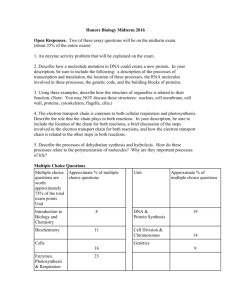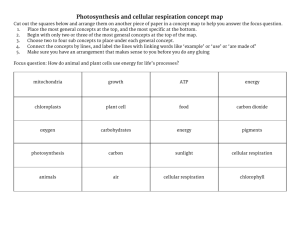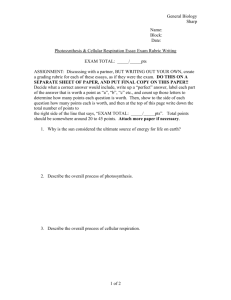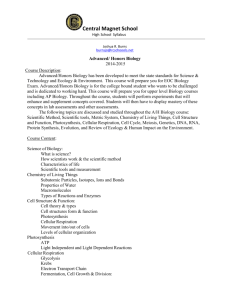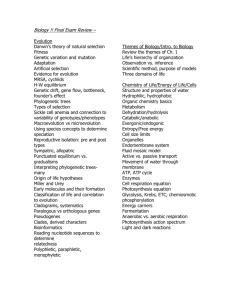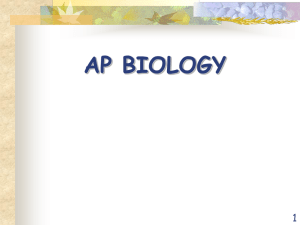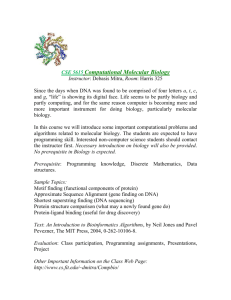1 Introduction: Biology Today 1 Essential Chemistry for Biology
advertisement
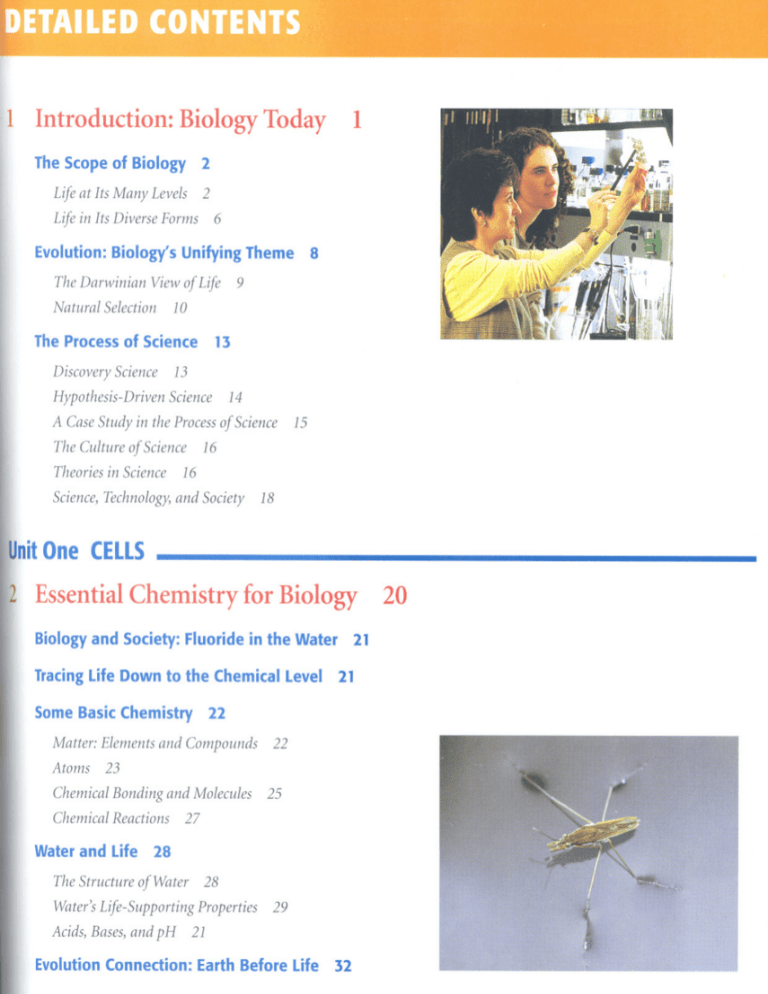
1 Introduction: Biology Today TheScope of Biology 1 2 Life at Its Many Levels 2 Life in Its Diverse Forms 6 8 Evolution: Biology's Unifying Theme The Darwinian View of Life Natural Selection 10 9 13 The Process of Science DiscoveryScience 13 Hypo thesis-Driven Science 14 A CaseStudy in the Processof Science The Culture of Science 16 Theories in Science 15 16 Science, Technology, and Society 18 UnitOne CELLS 2 Essential Chemistry for Biology Biologyand Society:Fluoride in the Water Tracing Life Down to the Chemical Level Some Basic Chemistry 21 21 22 Matter: Elements and Compounds Atoms 23 Chemical Bonding and Molecules Chemical Reactions 27 22 25 Water and Life 28 The Structure of Water 28 Water's Life-Supporting Properties Acids, Bases, and pH 29 21 Evolution Connection: Earth Before Life 32 20 3 The Molecules of Life 35 Biology and Society: Got Lactose? Organic Molecules 36 36 Carbon Chemistry 36 Giant Moleculesfrom SmallerBuilding Blocks 38 Biological Molecules 39 Carbohydrates 39 Lipids 42 Proteins 44 NucleicAcids 47 Evolution Connection: DNA and Proteins as Evolutionary Tape Measures 49 4 A Tour of the Cell 52 Biology and Society: Drugs That Target Cells The Microscopic World of Cells 53 Microscopes as Windows to Cells 54 The Two Major Categories of Cells 55 A Panoramic View of Eukaryotic Cells 57 Membrane Structureand Function 58 A Fluid Mosaic of Lipids and Proteins Selective Permeability 58 58 The Nucleus and Ribosomes: Genetic Control of the Cell 59 Structure and Function of the Nucleus Ribosomes 60 How DNA Controls the Cell 60 60 53 The Endomembrane System: Manufacturing and Distributing Cellular Products 61 The Endoplasmic Reticulum The Golgi Apparatus 61 62 Lysosomes 62 Vacuoles 63 Chloroplasts and Mitochondria: Energy Conversion 64 Chloroplasts 64 Mitochondria 65 The Cytoskeleton: Cell Shape and Movement 65 Maintaining Cell Shape 65 Cilia and Flagella 66 Cell Surfaces: Protection, Support, and Cell-Cell Interactions 67 Plant Cell Walls and Cell Junctions 68 Animal Cell Surfaces and Cell Junctions 68 Evolution Connection: The Origin of Membranes 69 5 The Working Cell 72 Biology and Society: Stonewashing Without the Stones 73 Some Basic Energy Concepts Conservation of Energy Entropy 73 74 Chemical Energy Food Calories 74 75 ATP and Cellular Work The Structureof ATP 76 76 PhosphateTransfer 77 The ATP Cycle 77 73 Enzymes 78 ActivationEnergy 78 InducedFit 78 Enzyme Inhibitors 78 Membrane Transport 80 PassiveTransport:DiffusionAcrossMembranes 80 Osmosisand WaterBalancein Cells 81 Active Transport: The Pumping of Molecules Across Membranes 82 Exocytosis and Endocytosis: Traffic of Large Molecules 82 The Role of Membranes in Cell Signaling 83 Evolution Connection: EvolvingEnzymes 84 6 Cellular Respiration: Harvesting Chemical Energy 87 Biology and Society: Feeling the IIBurn" 88 Energy Flow and Chemical Cycling in the Biosphere 88 Producersand Consumers 89 Chemical Cycling Between Photosynthesis and Cellular Respiration 89 Cellular Respiration: Aerobic Harvest of Food Energy 90 The Relationship Between Cellular Respiration and Breathing 90 The Overall Equation for Cellular Respiration The Role of Oxygen in Cellular Respiration 91 91 The Metabolic Pathway of Cellular Respiration Fermentation: Anaerobic Harvest of Food Energy 98 Fermentationin Human MuscleCells 98 Fermentation in Microorganisms 99 Evolution Connection: Life on an Anaerobic Earth 99 93 7 Photosynthesis: Converting Light Energy to Chemical Energy 102 Biologyand Society:Plant Power The Basics of Photosynthesis 103 103 Chloroplasts: Sites of Photosynthesis 103 The Overall Equation for Photosynthesis A Photosynthesis Road Map 105 105 The Light Reactions: Converting Solar Energy to Chemical Energy 106 The Nature of Sunlight Chloroplast Pigments 106 107 How Photosystems Harvest Light Energy 107 How the Light ReactionsGenerateATP and NADPH 109 The Calvin Cycle: Making Sugar from Carbon Dioxide 111 Water-Saving Adaptations of C4 and CAM Plants The Environmental Impact of Photosynthesis 112 113 How PhotosynthesisModeratesthe GreenhouseEffect 112 Evolution Connection: The Oxygen Revolution 114 UnitTwo GENETICS 8 The Cellular Basis of Reproduction and Inheritance 118 Biologyand Society:A $50,000 Egg! 119 What Cell ReproductionAccomplishes 119 PassingOn the Genesfrom Cellto Cell 120 TheReproductionof Organisms 120 The Cell Cycleand Mitosis Eukaryotic Chromosomes 121 121 11 Gene Regulation Biology and Society: Baby's First Bank Account 196 197 From Egg to Organism: How and Why Genes Are Regulated 197 Patterns of Gene Expression in Differentiated Cells 198 DNA Microarrays: Visualizing Gene Expression 198 The Genetic Potential of Cells 200 Reproductive Cloning of Animals 200 Therapeutic Cloning and Stem Cells 201 The Regulation of Gene Expression 203 GeneRegulationin Bacteria 203 GeneRegulationin the Nucleus of EukaryoticCells 204 Regulationin the Cytoplasm 206 CellSignaling 207 The Genetic Basis of Cancer 208 Genes That Cause Cancer 208 The Effects of Lifestyle on Cancer Risk 211 Evolution Connection: Homeotic Genes 12 DNA Technology 212 216 Biology and Society: Hunting for Genes 217 Recombinant DNATechnology 217 From Humulin to Genetically Modified Foods 218 Recombinant DNA Techniques 220 DNA Fingerprinting and Forensic Science Murder,Paternity,and Ancient DNA DNA FingerprintingTechniques 226 Genomics 229 The Human GenomeProject 230 225 224 Tracking the Anthrax Killer 231 Genome-Mapping Techniques 232 Human Gene Therapy 234 Treating Severe Combined Immunodeficiency Safety and Ethical Issues 2234 235 The Controversy Over Genetically Modified Foods 235 Ethical Questions Raised by DNA Technology 236 Evolution Connection: Genomes Hold Clues to Evolution 237 UnitThree EVOLUTION ANDDIVERSITY 242 13 How Populations Evolve Biology and Society: Persistent Pests 243 Charles Darwin and The Origin of Species 244 Darwin'sCulturalandScientificContext 245 Descentwith Modification 248 Evidence of Evolution 249 The FossilRecord 250 Biogeography 251 ComparativeAnatomy 251 ComparativeEmbryology 252 MolecularBiology 253 Natural Selection and Adaptive Evolution 254 Darwin'sTheoryofNaturalSelection 254 NaturalSelectioninAction 255 The Modern Synthesis: Darwinism Meets Genetics 256 Populations as the Units of Evolution 256 GeneticVariationin Populations 257 AnalyzingGene Pools 258 Population Genetics and Health Science 259 Microevolution as Change in a Gene Pool 260 Mechanisms of Microevolution 260 GeneticDrift 261 GeneFlow 263 Mutations 263 Natural Selection: A Closer Look 263 Evolution Connection: Population Genetics of the Sickle-Cell Allele 266 14 How Biological Diversity Evolves 270 Biology and Society: The Impact of Asteroids 271 Macroevolution and the Diversity of Life 271 The Originof Species 272 What Is a Species? 272 Reproductive Barriers Between Species Mechanisms of Speciation 274 275 What Is the Tempo of Speciation? 278 The Evolution of Biological Novelty 280 Adaptation of Old Structures for New Functions 280 "Evo-Devo": Development and Evolutionary Novelty Earth History and Macroevolution Geologic Time and the FossilRecord 281 282 282 Continental Drift and Macroevolution 285 Mass Extinctions and Explosive Diversifications of Life 285 Classifying the Diversity of Life 287 Some Basics of Taxonomy 287 Classification and Phylogeny 288 ArrangingLife into Kingdoms:A Work in Progress 290 Evolution Connection: Just a Theory? 292 15 The Evolution of MicrobialLife 296 Biology and Society: Bioterrorism 297 Major Episodesin the History of Life 297 The Origin of Life 300 Resolving the Biogenesis Paradox 300 A Four-Stage Hypothesis for the Origin of Life 300 From Chemical Evolution to Darwinian Evolution prokaryotes 302 303 They're Everywhere! 303 The Two Main Branches of Prokaryotic Evolution: Bacteria and Archaea 304 The Structure, Function, and Reproduction of Prokaryotes 304 The Nutritional Diversity of Prokaryotes The Ecological Impact of Prokaryotes Protists 307 307 311 The Origin of Eukaryotic Cells 311 TheDiversityofProtists 312 Evolution Connection: The Origin of Multicellular Life 317 16 Plants, Fungi, and the Move onto Land 320 Biology and Society: The Balancing Act of Forest Conservation 321 :: ~ l,tA . j" .. i.. ~ :. ColonizingLand 321 TerrestrialAdaptations of Plants 321 The Origin of Plants from Green Algae Plant Diversity 324 Highlightsof Plant Evolution 324 Bryophytes 325 323 - ~~>~-~ .. Ferns 327 Gymnosperms 328 Angiosperms 330 Plant Diversity as a Nonrenewable Resource Fungi 332 334 Characteristicsof Fungi 336 The EcologicalImpact of Fungi 337 Evolution Connection: Mutual Symbiosis 17 The Evolution of Animals 340 343 Biology and Society: Invasion of the Killer Toads 344 The Origins of Animal Diversity 344 WhatIsanAnimal? 344 EarlyAnimals and the Cambrian Explosion 346 Animal Phylogeny 347 MajorInvertebrate Phyla 349 Sponges 350 Cnidarians 350 Flatworms 351 Roundworms 351 Mollusks 353 Annelids 354 Arthropods 356 Echinoderms 359 The Vertebrate Genealogy 360 Characteristicsof Chordates 361 Fishes 363 Amphibians 364 Reptiles 365 Birds 366 Mammals 367 The Human Ancestry 368 The Evolution of Primates 368 TheEmergenceofHumankind 370 EvolutionConnection:Earth's New Crisis 376 UnitFour ECOLOGY 18 The Ecology of Organisms and Populations 380 Biology and Society: The Human Population Explosion 381 An Overview of Ecology 381 Ecology as Scientific Study 382 A Hierarchyof Interactions 383 Ecologyand Environmentalism 383 Abiotic Factorsof the Biosphere 384 The Evolutionary Adaptations of Organisms Physiological Responses Anatomical Responses 387 387 388 BehavioralResponses 388 What Is Population Ecology? 388 PopulationDensity 389 Patternsof Dispersion 390 PopulationGrowthModels 390 Regulationof Population Growth 392 Human PopulationGrowth 395 Life Histories and Their Evolution 398 Life Tables and Survivorship Curves 399 LifeHistory Traitsas EvolutionaryAdaptations 400 Evolution Connection: Testing a Darwinian Hypothesis 401 406 19 Communities and Ecosystems Biology and Society: Reefs: Coral and Artificial Key Properties of Communities 407 407 Diversity 408 PrevalentFormof Vegetation 408 Stability 408 TrophicStructure 409 Interspecific Interactions in Communities 409 CompetitionBetween Species 409 Predation 410 SymbioticRelationships 414 The Complexityof Community Networks 415 Disturbance of Communities 415 Ecological Succession 416 A Dynamic View of Community Structure 417 An Overview of Ecosystem Dynamics 417 TrophicLevelsand FoodChains 419 FoodWebs 419 EnergyFlow in Ecosystems 421 Productivity and the Energy Budgets of Ecosystems Energy Pyramids 422 Ecosystem Energetics and Human Nutrition Chemical Cycling in Ecosystems 423 424 The GeneralSchemeof ChemicalCycling 424 Examplesof BiogeochemicalCycles 425 Biomes 428 How ClimateAffectsBiome Distribution 428 TerrestrialBiomes 428 FreshwaterBiomes 434 Marine Biomes 435 Evolution Connection: Coevolution in Biological Communities 438 421 20 Human Impact on the Environment 442 Biology and Society: Aquarium Menaces 443 HumanImpact on Biological Communities 443 HumanDisturbanceof Communities 444 IntroducedSpecies 444 Human Impact on Ecosystems 446 Impact on ChemicalCycles 446 Deforestationand ChemicalCycles:A CaseStudy 447 The Releaseof ToxicChemicalsto Ecosystems 448 Human Impact on theAtmosphere and Climate 449 The Biodiversity Crisis 452 The ThreeLevelsof Biodiversity 452 The Lossof Species 452 The ThreeMain Causesof the BiodiversityCrisis 454 Why BiodiversityMatters 455 Conservation Biology 456 Biodiversity"Hot Spots" 456 Conservationat the Populationand SpeciesLevels 457 Conservationat the EcosystemLevel 459 The Goalof SustainableDevelopment 461 Evolution Connection: Biophilia and an Environmental Ethic 462 Appendix A Metric Conversion Table Appendix B Answers to Self-Quiz Questions Appendix C Credits Glossary Index


